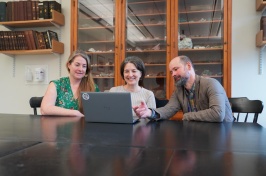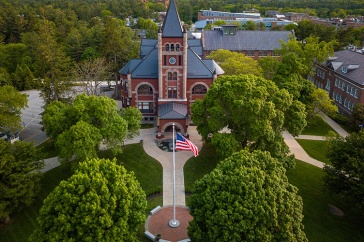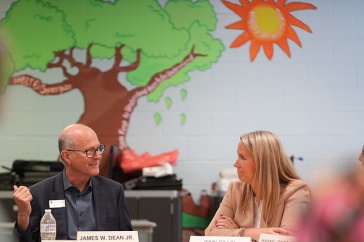
Like almost anyone traveling overseas, Jaque Damon stuffed her bags to the gills for her trip to Haiti this fall. Unlike most other people, though, Damon’s two 50-pound suitcases were loaded with medications, sanitary products and baby items — medical supplies for a volunteer mission in Hinche. Damon spent the first week of November with Midwives for Haiti, a nonprofit organization that helps train local women to become skilled birth attendants. For the UNH Health Services nursing triage supervisor, it was a bit of a return to her professional roots as a labor and delivery nurse — and an opportunity to learn as well as to teach.
Midwives for Haiti was established in 2005 by an American midwife who had observed firsthand the lack of resources for pregnant women, from prenatal care and education programs to safe, clean facilities for giving birth. Poverty in the country is widespread — many communities don’t have electricity or access to clean water — and reaching medical care often means several hours’ travel on unpaved roads. The impact on women’s health, in particular, is significant: Up to 30 percent of newborns don’t survive, and Haiti’s annual maternal death rates are the highest in the Western Hemisphere.
Developed to meet Haiti’s maternal medical needs in ways that are both realistic and culturally appropriate, Midwives for Haiti trains Haitian nurses to become skilled birth assistants who can provide labor and nursing care to women in rural communities. The free, 12-month program is a mix of classroom lectures and simulations, clinical hours and weekly case studies taught by full-time, in-country staff — all supplemented with skill-specific training provided by volunteer midwives and other medical professionals. Damon, who worked in labor and delivery at Portsmouth Regional Hospital for years before coming to UNH, had been thinking for some time about finding a way to offer her skills outside of the local community. When she ran into a former colleague who had recently returned from a weeklong stint with Midwives for Haiti, she knew she had found the perfect match.
“It’s something I’d always wanted to do,” says Damon, who spent the majority of her week teaching at the program’s headquarters in Hinche, an hour and a half from Port au Prince, and providing care in the Hinche hospital. She also spent a day traveling with the mobile prenatal clinic to conduct prenatal checkups in rural villages and another helping at an orphanage where families often leave their children temporarily for health care and nutrition support. “It was a truly eye-opening experience. The need for maternal nursing care and education is just huge.”
It was also a far cry from Damon’s typical work. As triage nursing supervisor at UNH, she spends her days reviewing the medical complaints of students who come into Health Services and assigning them to caregivers based on their level of urgency. “In Haiti, the needs we were addressing were much more basic,” she explains. “In the hospital, families are responsible for providing clean water, food and even their own sheets. Knowing you were doing work that would help a woman educate herself and support her community was a great feeling.”
Since 2006, Midwives for Haiti has graduated 95 skilled birth attendants who now work throughout the country providing high-quality maternal care. For the past three years, the organization has also run a matron outreach program, which partners with the traditional birth attendants who still oversee the majority of Haitian home births.
Damon says she will definitely return for another week of service when the opportunity arises. “I’m so grateful to my colleagues here at UNH, both for giving me the time off during the school year to make this trip and for donating the supplies I was able to bring. It’s hard to convey what a need there is and what an impact those provisions have.”
Noting that the premise behind the program is for volunteers to learn as much as they teach, Damon says it was a true educational experience. “The idea is to meet people where they live and provide training that is practical and feasible. In that regard, I can honestly say I learned as much as I taught, if not more.”
-
Written By:
Kristin Waterfield Duisberg | Communications and Public Affairs





















































